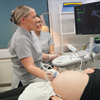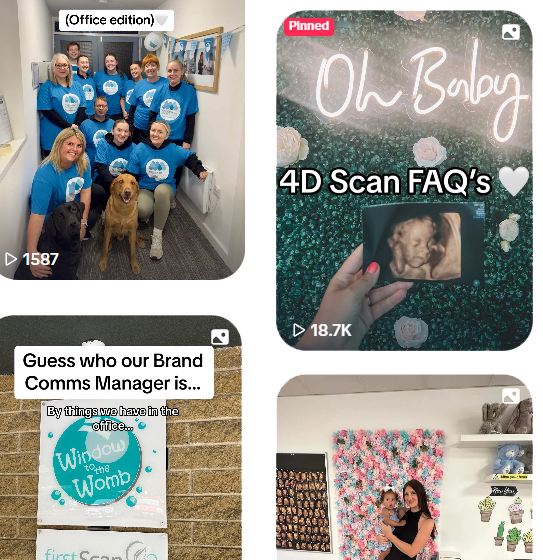The cause for pre-eclampsia is thought to be when the placenta isn’t working properly. If you don’t receive the treatment that you need, it can make you and your baby quite ill.
Pre-eclampsia reduces the flow of the blood through the placenta, resulting in your baby not getting enough oxygen and nutrients, which can restrict their growth.
Pre-eclampsia usually happens during the second half of pregnancy or shortly after the birth. You’re most likely to develop it after 27 weeks of pregnancy.
Symptoms of Pre-Eclampsia
Your GP or midwife will carry out tests on your blood pressure and protein in your urine at every antenatal appointment.
You won’t be able to tell if you have high blood pressure or protein in your wee, but you can look out for other signs and symptoms of pre-eclampsia:
1- Sudden, severe swelling of your face, hands or feet.
2- Severe headaches and/or vomiting.
3- Problems with your vision, such as blurring or flashing before your eyes.
4- Severe pain just below your ribs.
5- Feeling generally unwell.
If you notice any of these symptoms, contact your GP, midwife or maternity unit straight away.
Pre-eclampsia can range from mild to severe. Mild pre-eclampsia I common, and affects up to one first-time mums-to-be in ten. If it is mild, you might not know that you have it until your midwife picks up the signs. Early monitoring and treatment will help to keep you and your baby healthy. Severe pre-eclampsia is much less common.
Likelihood of Getting Pre-eclampsia
You’re much more likely to develop pre-eclampsia if you:
– Had pre-eclampsia in a previous pregnancy. About 1 in 6 mums get it again.
– Have chronic kidney disease.
– Have an autoimmune condition, such as lupus.
– Have diabetes.
– Had high blood pressure before you were pregnant.
If any of these apply to you, your midwife will recommend that you take a low dose of aspirin every day from 12 weeks of pregnancy. You might also have extra antenatal appointments to check your baby’s growth.
You have a moderately increased risk of developing pre-eclampsia if:
– This is your first baby.
– Your sister or mum had pre-eclampsia
– You had a 10 year or more age gap between pregnancies.
– You are 40 or over.
– You were obese before you were pregnant, with a BMI of 35 or more at the start of your pregnancy.
– You are expecting twins or triplets.
If two or more of these apply to you, your GP will recommend that you take a low dose of aspirin every day from 12 weeks of pregnancy. If your midwife is worried about the well-being of your baby, you will be offered CTG monitoring after 26 weeks of pregnancy. If this is your first baby, you’ll have more antenatal appointments than if you were already a mum.
Research suggests that donor-egg pregnancies are also at high risk of developing pre-eclampsia. If this is the case with your pregnancy, speak with your GP or midwife about options for extra appointments.
Prevention of Pre-eclampsia
There’s no way to prevent pre-eclampsia for certain. The best tactic is to attend all of your antenatal appointments and take any medication that has been prescribed for you, even if you feel well in yourself.
Treatment
If you’re diagnosed with pre-eclampsia, you should be admitted to hospital so you can be monitored, depending on how severe your pre-eclampsia is.
Mild pre-eclampsia
You’ll have your blood pressure checked at least four times a day and blood tests to check for complications. Depending on the test results, you may be able to go home and rest and attend further check-ups as an outpatient or you may need to stay in hospital for longer to be monitored.
Moderate pre-eclampsia
You’ll have your blood pressure checked at least four times a day and have medication to lower your blood pressure. You’ll have ultrasound scans, which will probably include doppler scans, to measure the flow of blood from the placenta to your baby.
If your baby is well, and your condition improves over the following days, you might be able to go home before your baby is born. If you haven’t had your baby by the time you are between 39 and 40 weeks pregnant, you may be offered an induction.
Severe pre-eclampsia
You’ll most likely need to stay in hospital if you have severe pre-eclampsia. You can then be monitored even more closely, with frequent blood pressure, urine and blood tests, as well as medication to control your blood pressure. Your baby will also be checked carefully, with their growth and well-being being monitored by scans and their heartrate being measured.
Hospital staff will do all they can to prevent any complications developing. Your fluid levels will be controlled and you may be put on a drip that contains magnesium sulphate. Magnesium sulphate will lower your risk of developing eclampsia. Sometimes, severe pre-eclampsia can cause a fit and magnesium sulphate can prevent a fit from recurring.
If your blood pressure cannot be controlled and your doctor is concerned about your baby’s well-being, your baby may need to be born earlier than expected. Your doctor should look carefully at your circumstances and explain all your options. You may be advised to have an induction or have your baby by caesarean.
If your baby is born early, they’re likely to be fine. Every case of pre-eclampsia is different. So a lot will depend on how early they were born and their birth weight.
Other Complications
If pre-eclampsia goes from mild to severe, it starts to affect other systems of your body as it worsens. This means you may get more serious symptoms as the condition sets in, and you may need to go to intensive care or a maternity high dependency unit. If you have pre-eclampsia but remain undiagnosed, you won’t receive the right treatment which can result in serious complications:
Eclampsia
This is a rare but serious condition that happens when the membranes of your brain become irritated. It can lead to seizures or convulsions and can put you and your baby at huge risk.
Eclampsia can develop during pregnancy and birth. It can also happen in the weeks after your baby is born, especially in the first few days and if your pre-eclampsia was severe. Though eclampsia is a severe illness, complications caused by pre-eclampsia only very rarely become serious enough to be life threatening.
HELLP Syndrome
This is a rare liver and blood-clotting disorder that can develop before pre-eclampsia has been diagnosed. It stands for:
H: haemolysis, which is the breaking down of red blood cells
EL: elevated liver enzymes, which is a sign that your liver is not working properly.
LP: low platelet count, which means you may not have enough platelets to help your blood to clot.
HELLP is most likely to develop after birth but it can sometimes develop from mid-pregnancy onwards, or in rare cases, even earlier.
Other complications
These can include:
Liver and kidney failure
Stroke
Fluid in the lungs
Blind patches
Be reassured that because your midwife and GP are looking out so carefully for pre-eclampsia, it is very unlikely to cause you any problems.
Pre-eclampsia can be treated so it’s important that you attend all your antenatal appointments. This way it can be picked up and managed as early as possible.
Recovery
You are very likely to make a full recovery from pre-eclampsia. But you will need to rest and recover in hospital for a few days after your baby’s birth, so your blood pressure can be monitored. Your blood pressure should return to normal within weeks of giving birth. Routine checks after your baby’s birth may show that you had high blood pressure before you were pregnant. If this is the case, you may need to continue with treatment for high blood pressure.
Rarely, serious complications such as eclampsia or HELLP can have long-term effects on your health, such as cause kidney problems. However, most cases of pre-eclampsia are picked up and treated in time to prevent this.
If you had severe pre-eclampsia or eclampsia, your doctor should explain what happened, and whether or not it may affect your future pregnancies. Pre-eclampsia puts you at risk of developing high blood pressure and related problems in later life, so checking your blood pressure regularly will be important. Always ask your doctor or midwife if you have any questions about your treatment.













 Packages & Prices
Packages & Prices  Important Info & Policies
Important Info & Policies  Your Scan
Your Scan